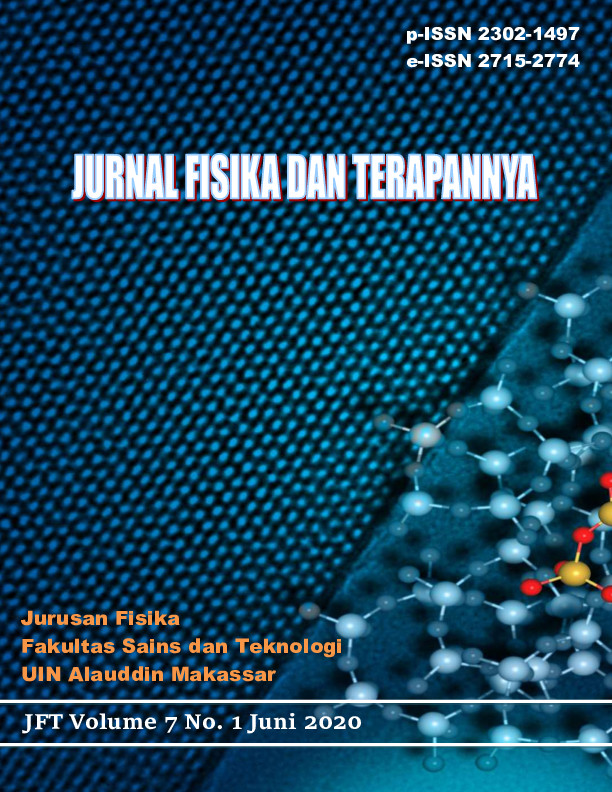PERBANDINGAN LAJU KOROSI PAKU BETON PADA MEDIUM AIR PDAM DAN AIR LIMBAH AC (AIR CONDICIONER)
Abstrak
The purpose of this study was to compare the corrosion rate of concrete nails with the medium of PDAM water and AC wastewater. The method used is the weight loss method. Immersion of the sample is carried out for 30 days and measurements are carried out and corrosion rate analysis is carried out every 10 days. Nail corrosion rate with PDAM water medium was obtained at 4.06 × 10-7 mm / year, while the corrosion rate of nails with AC wastewater medium based on variations in PK size and temperature size regulation on each AC obtained the largest corrosion rate on AC PK 1 ½ with a temperature of 18oC 4 × 10-7 mm / year, a temperature of 190C 2.66 × 10-7 mm / year, 20oC, 5.77 × 10-7 mm / year and a temperature of 21oC, 5.88 × 10-7 mm / year. AC PK 2 with a temperature of 19oC, 5.26 × 10-7 mm / year, a temperature of 20oC, 7.97 × 10-7 mm / year, a temperature of 21oC, 4.95 × 10-7 mm / year and a temperature of 22oC 3.49 × 10 -7 mm / year. For AC PK 1 with a temperature of 20oC, 3.77 × 10-7 mm / year, a temperature of 21oC 5.74 × 10-7 mm / year, a temperature of 22 oC, 8.11 × 10-7 mm / year and a temperature of 23oC 8.96 × 10-7 mm / year.
##plugins.generic.usageStats.downloads##
Referensi
ASTM International. (2004). ASTM G31-72: Standar Practice for Laboratory Immersion Corrosion Testing Of Metals. United State.
Aulia Azizah. (2011). Analisis Kualitas Udara Ambien dengan Parameter Gas SO2, NO2 dan CO di Balai Hiperkes dan Keselamatan Kerja Provinsi Kalimantan Selatan: Banjarbaru.
Azharuddin Sahil. (2007). Indeks Alquran. PT Mizan Pustaka. Bandung.
Badan Pusat Statistik Jakarta Pusat. (2017). Data dan Informasi Penggunaan Air Conditioner (AC) di Indonesia. Badan Pusat Statistik: Jakarta.
Bagotsky, V.S. (2006). Fundamental of Electrochemical. John Wiley and Sons : New York. Chamberlain J., Trethewey KR. (1991).Korosi (Untuk Mahasiswa dan Rekayasawan). PT Gramedia Pustaka Utama: Jakarta.
Dalimunthe, I.S. (2004). Kimia Dari Inhibitor Korosi. Skripsi: Universitas Sumatera Utara.
Davis, H, E. (1982). The Testing of Engineering Materials”. Mc Graw Hill Inc: Auckland.
Jamaluddin, Agus dkk. (2012). Analisis Kerusakan X-RAY FLUORESENCE (XRF): ISSN 1979-2409. Jakarta.
Kawamura, S. (1991). Integrated Design of Water Treatment Facilities. John Willey and Sons.
Kementerian Kesehatan RI. (2017). Permenkes RI. Nomor 23 Tahun 2017 Tentang Standar Baku Mutu Kesehatan Lingkungan: Kementerian Kesehatan RI.
Madhifitri, Gapsari. (2017). Pengantar Korosi. Universitas Brawijaya Pres. Malang.
M. Quraish Shihab. (2002). Tafsir Al Misbah. Vol 9,12,14; Jakarta. Lentera Hati.
Sutrisno, C Totok. (2006). Teknologi Penyediaan Air Bersih”. Rineke Cipta: Jakarta.
Tiswan dan Djamaluddin Ramlan. (2017). Pemanfaatan Air Buangan Air Conditioner (AC) sebagai air bersih di Kampus 7 Poltekes Kemenkes”. Keslingmas Vol. 37. No. 4 : Semarang.
Tanubrata M. (2015). Bahan-bahan konstruksi dalam konteks sipil” : Jurnal Teknik Sipil, Universitas Sumatera Utara. Sumber-sumber Air. Medan: USU.
Wahyu H. Piarah, dan Zuryati Djafar. (2006). Analisa Kelayakan Kondensat Sistem Pengkondisian Udadlam artikelra (AC) sebagai Air Minum. Jurnal Vol. III, No. 2 Lembaga Penelitian Unhas : Buletin Penelitian.
Widharto Sri. (2001). Karat dan Pencegahannya. Cetakan Kedua. Jakarta: PT. Pradnya Paramita.
Yap K.H.F. (1999). Konstruksi Kayu. CV Trimitra Mandiri. Bandung.


